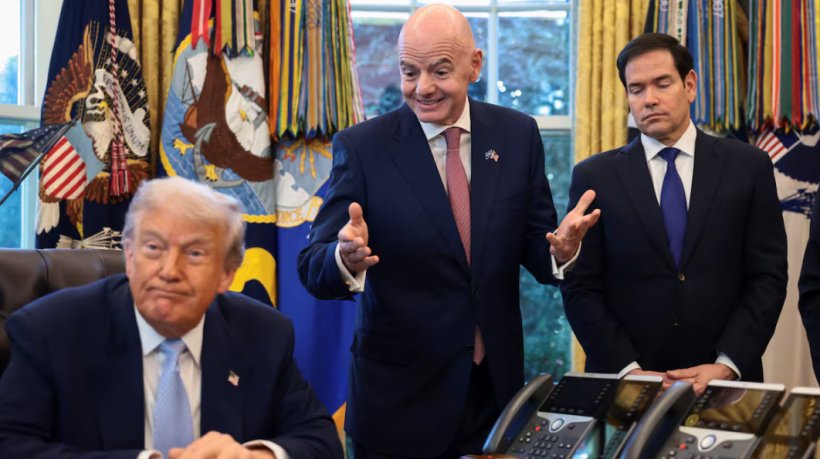
Will the 2026 World Cup Turn into an Unprecedented Political Controversy?
The recent meeting of the 2026 World Cup task force, held as usual at the White House with the attendance of U.S. President Donald Trump and FIFA President Gianni Infantino, was marked by an atmosphere of concern after Trump once again threatened to exclude some of the host cities, particularly those managed by Democratic officials. This move could place FIFA in a significant political dilemma just seven months before the tournament begins.
During the meeting, which was also attended by U.S. Secretary of State Marco Rubio and Secretary of Homeland Security Kristi Noem, President Trump was asked about the election of Kshama Sawant—a left-leaning figure—as mayor of Seattle, one of the host cities. Trump responded, saying, "If we see any potential problems, I will ask Gianni to move the games to another city…"
The American president added: "If any problems arise in Seattle, where they have a very liberal/communist mayor... we will say: Gianni, may I suggest moving the event? We will move it to a welcoming and safe place."
Infantino, who seemed caught between political considerations and FIFA's commitments, responded: "Yes, I believe that security is the top priority for the success of any World Cup tournament," a statement that reopened doubts about the future of some host cities, especially those that Trump has been criticizing for some time.
According to the Spanish newspaper "AS," the United States, which is co-hosting the tournament along with Mexico and Canada, has 11 officially announced cities as venues for the global event. Most of these cities, such as Los Angeles, New York, Atlanta, Houston, Boston, Philadelphia, and Seattle, are governed by local councils or mayors who are Democrats, making them susceptible to political criticism from Trump.
The newspaper added that any attempt to redistribute the matches or exclude cities at this stage would create logistical, economic, and political chaos for FIFA, especially since the logistical preparations and investments for these cities have reached advanced stages.
Amid rising tensions between the U.S. administration and Democratic cities, concerns are growing that the preparations for the 2026 World Cup could become a ground for unprecedented political controversy.
During the meeting, which was also attended by U.S. Secretary of State Marco Rubio and Secretary of Homeland Security Kristi Noem, President Trump was asked about the election of Kshama Sawant—a left-leaning figure—as mayor of Seattle, one of the host cities. Trump responded, saying, "If we see any potential problems, I will ask Gianni to move the games to another city…"
The American president added: "If any problems arise in Seattle, where they have a very liberal/communist mayor... we will say: Gianni, may I suggest moving the event? We will move it to a welcoming and safe place."
Infantino, who seemed caught between political considerations and FIFA's commitments, responded: "Yes, I believe that security is the top priority for the success of any World Cup tournament," a statement that reopened doubts about the future of some host cities, especially those that Trump has been criticizing for some time.
According to the Spanish newspaper "AS," the United States, which is co-hosting the tournament along with Mexico and Canada, has 11 officially announced cities as venues for the global event. Most of these cities, such as Los Angeles, New York, Atlanta, Houston, Boston, Philadelphia, and Seattle, are governed by local councils or mayors who are Democrats, making them susceptible to political criticism from Trump.
The newspaper added that any attempt to redistribute the matches or exclude cities at this stage would create logistical, economic, and political chaos for FIFA, especially since the logistical preparations and investments for these cities have reached advanced stages.
Amid rising tensions between the U.S. administration and Democratic cities, concerns are growing that the preparations for the 2026 World Cup could become a ground for unprecedented political controversy.










